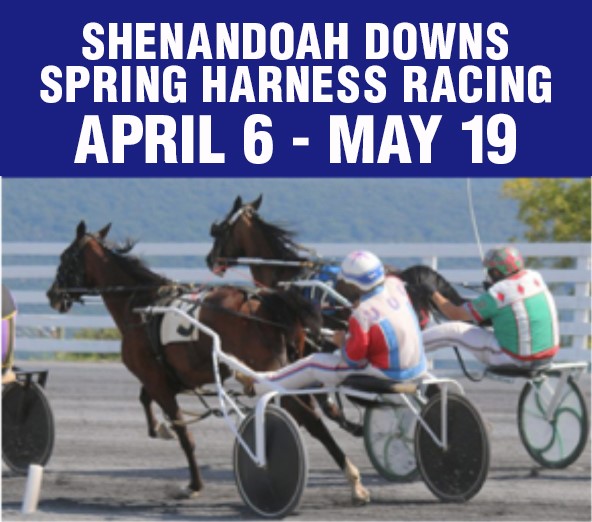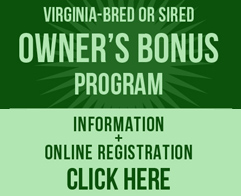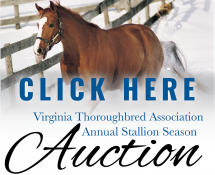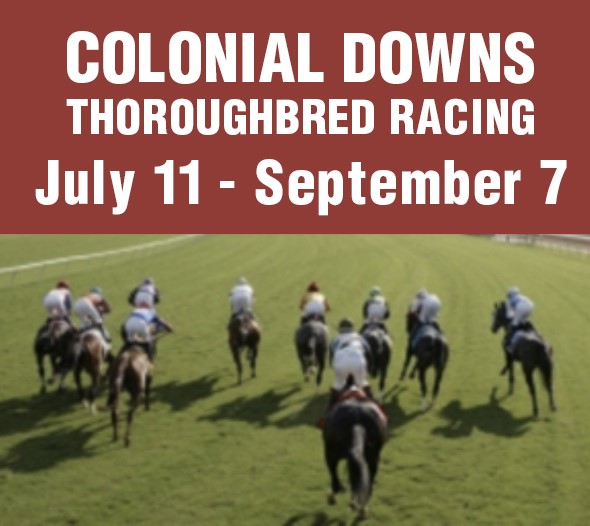Off And Running: New Virginia Residency Program A Certified Success
by Natalie Voss | 07.23.2018 | 6:36pm

Just a few years ago, Virginia’s historic Thoroughbred industry, which had once cradled Secretariat, looked poised for a slow death. Colonial Downs ran its last race in 2013, and a bitter, dramatic series of arguments between the horsemen and track owner Jacobs Entertainment kept it closed. The state already had lost ground to West Virginia and Pennsylvania, where purses were growing fatter with revenue from expanded gaming. The end of Colonial would have seemed to be the final nail in the coffin as horses took one-way van rides to other backstretches.
Now, there is a renewed sense of optimism in Virginia. The previously conservative state legislature passed a law allowing historical racing machines, to the surprise of even those remaining in the state’s Thoroughbred industry. Debbie Easter, executive director of the Virginia Thoroughbred Association, said the VTA was asked to draw up a business plan last fall outlining the ways they would use extra revenue from historical racing.
“I would never have bet on that happening three months later,” she admits now.
Easter is hopeful the first three to four historical racing facilities may be up and running by January, but the timeline depends on the finalization of rules and regulations guiding the new form of wagering. The Virginia Racing Commission is working on a draft now, and the proposal will receive comments from the governor’s office and the general public before it can become final. Colonial Downs, which was sold this spring to Revolutionary Racing and Peninsula Pacific for over $20 million, has set fire to its turf course—its traditional form of revamping the grass in anticipation of a spring racing season. Official dates remain TBD, but many are hoping for a meet in 2019.
Of course, to get the horse population (not to mention racing officials, jockeys, and others) needed for a meet, Easter admits there will need to be something you don’t normally see a lot of in racing: cooperation.

Debbie Easter
The state’s Thoroughbred economy already was on an upswing before the renewed hope for the track reopening, however. In July, the VTA completed the inaugural year of its Virginia-Certified residency program, which was designed to be a solution to a short (or non-existent) racing season. Virginia-Certified horses must spend at least six consecutive months at a Virginia-Certified farm or training center prior to the end of their 2-year-old year. They’re then eligible for a 25 percent purse bonus for a win in New York, New Jersey, Pennsylvania, Delaware, West Virginia, or Maryland. And, Easter said, owners can double up on incentive programs: a horse can be born in Maryland and qualify as a “Maryland-bred,” then start training in Virginia to become “Virginia-Certified.”
Carrying out that example, Maryland-breds get 30 percent purse bonuses to breeders and 30 percent to owners in applicable races. Easter points out for a homebred in both programs, an owner/breeder could be looking at an 85 percent purse bonus. Rack up a couple of wins like that, and your horse can pay for his six-month stay in Virginia.
“It has been terribly successful,” Easter said. “We budgeted for 400 horses to come in the state the first year. About 700 horses signed up for the program in year one. That is super. We’re talking to our member farms, and they’re full. They’re building capital projects, they’re hiring people, they’re building barns. I’ve got a guy who hasn’t been in the business for 15 years who’s getting back into it. It’s that kind of economic impact.”
Karen Dennehy Godsey, trainer and co-owner of Eagle Point Farm in Ashland, Va., has seen an incredible bump in business. Where she’d previously have one or two yearlings at Eagle Point, she now has 30.
“I have a ton of clients who absolutely love it; they’re sending all the horses they can to be certified,” she said. “Purses haven’t quite inflated with the costs of keeping a racehorse. All these incentive programs – you have to take advantage of it.”

A barn under construction at the Middleburg Training Center, where new owner Chuck Kuhn said the phones have been ringing thanks to the Virginia-Certified program
Godsey isn’t sure yet how a Colonial meet may impact her operation. When the track ran in the summer, she would take a string of 15 or 20 to the New Kent track, but many of them would go back to other trainers farther up the East Coast when the meet concluded. She’s not sure what to expect now.
The extra business has allowed her to make some significant renovations to Eagle Point, which was established in 1947. Godsey has replaced fencing, added new run-in sheds, resurfaced her training track, and given her staff a raise.
“I’ve been able to raise rates,” she said. “It’s absolutely been a blessing.”
Stephanie Nixon, VHBPA vice president, trainer and owner of Horseshoe Hill Farm in Ashland, said she just completed construction on a new barn to accommodate the influx of horses she’s expecting as a result of the Virginia-Certified program. So far she hasn’t seen a significant change in volume, but is seeing the same clients send horses earlier than they previously had to meet the six-month requirement.
“The tide and the mood has changed as far as excitement about horses in the state of Virginia,” she said. “I just got back from a national HBPA convention in Iowa and folks that far out were talking about it.
“I actually just bought some horses of my own again. I went ahead and got some before I knew what was going on with the track situation, because this enticed me to be able to run them all over the Mid-Atlantic.”
Nixon believes that the return of racing to the state ultimately speaks to a spirit of cooperation.
“We really do have a strong group in Virginia: the breeders, the HBPA, the trotters, the Virginia Gold Cup folks – we all work together,” she said. “I think that’s the only reason it survived, is that we were able to pull together and do what was best for the industry as a whole. If you look at other states, this is sort of unique.”
Easter remains doubtful the state breeding program is likely to pick up significantly as a result of the track reopening. There were 115 foals born in Virginia in 2018, and the foal crop decreased roughly 70 percent from 2007 to 2016, according to Jockey Club data.
“We’re hopeful that would happen, but I think history and reality say it’s not going to happen. I think what we know from having Colonial open a short time in the past is without a year-round program like you have in Maryland or Pennsylvania, it’s tough to build a breeding program on that,” she said. “Plus, without alternative forms of gaming to help supplement your breeding program, it’s really tough to compete with those other states for us.”
She does think the Virginia-Certified program will add value to participants at the 2-year-old sales. This year’s Fasig-Tipton 2-year-old sale at Timonium was the first public auction where Easter Virginia-Certified appeared in catalogue pages. Easter is working to compile data that determines what impact Virginia-Certified status is having on sale prices.
In the meantime, Godsey said the Virginia-Certified option is giving her one of the best problems she’s had in years: she has more interested clientele than space.
“I know a couple of people who had gone out of business, and a couple who were about to go out of business, and they have full barns now,” she said. “The great thing is Woodberry [Payne, local trainer] called me and said, ‘I’ve got these horses coming from New York but I’m completely full,’ and I was completely full and had to call the next person. It’s great – people who struggled to keep things together, now their farms are full.”
New to the Paulick Report? Click here to sign up for our daily email newsletter to keep up on this and other stories happening in the Thoroughbred industry.
Copyright © 2018 Paulick Report.








